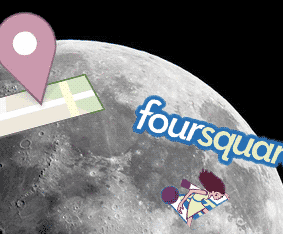I’ve been meeting other Vancouver entrepreneurs at various networking events and discussing ideas with them. A common theme I’m seeing is that most of them are very focused on building technology with location-based data at the heart of the application. This is the next (or current) big thing and it feels like everyone is jumping on the bandwagon.
The fact that everyone is focusing on this really validates it’s importance. We all agree. But is this causing saturation in this area of development? Will it make the field overly competitive and harder to build a viable business model? After all, how many FourSquare‘s do we need?
I was just talking with my new good friend, Weston Triemstra, who I recently met at a networking event. He has been actively following this space for the past 18 months and thinks there is plenty of space in the location-based app arena, and it’s far from being saturated.
Last night I attended an event where Compass Engine, the makers of Catch The Canary, were talking about their experience in the location-based space, and more broadly, their experience building a start-up in Vancouver. Catch The Canary encourages users to collect time-expiring tokens from around Vancouver. The tokens are virtual, in that they only exist in cyberspace, but your phone needs to be located in the real world near to their defined longitude and latitude in order to “pick them up”. Once a user receives enough tokens of the same type they can exchange them for a voucher for a free BigMac, Lululemon voucher, a meal in a local restaurant, or other such prizes. It’s a great idea. They are now working on other location-based games, which I will not talk about here, but I think have a great chance of success.
Another Vancouver based startup to keep an eye out for in this space is Flock And Swarm who plan to revolutionize mobile entertainment through location-based applications.
While all the ideas I have heard so far are great ideas, with great potential, I’m still looking for that idea that is totally surreal, and thinks completely out of the box. How can we use this new dimension of information in a way that nobody has done before? Something that does not relate to existing real-world events? I’m interested in the ideas that are so far out there that they only have a chance of investment by really smart investors, with great vision.
Has FourSquare cornered the market here? Not really. My guess is that Twitter probably have more location based data in the past 6 months than FourSquare do, since location data can now be attached to tweets. There are also a lot of mobile app developers who probably have user location information, even though location-based features are not their main focus. If all of these app developers pooled their collective data we could probably have a nicely sized dataset. But what would we do with it? What would be an ethical use of this kind of data? Do you really know what app developers are already doing with that data when you click “ok, share my location with this app”? Who’s monitoring this? What is fair use? Should there be a committee somewhere thinking of all the evil things that might be done with this data if gets into the wrong hands, and then figuring out some guidelines to combat these evil deeds?
My final question is, does FourSquare work on the moon?
Here I am! Longitude 49.286226, Latitude -123.11641

I don’t have answers to any of the questions you have asked, but something tangential to your thoughts on the topic is written up quite well in this article “Location-based check-in data on its way to becoming a commodity” – https://venturebeat.com/2010/08/12/location-based-check-in-data-on-its-way-to-becoming-a-commodity
Thanks for the link Jerome. It does seem inevitable that the big guys will own the raw data on this space, just as Google, and now Microsoft, have owned maps. FourSquare have a lot of momentum, but then it’s easy for the big guys to simply buy them up. Twitter, in the micro-blogging space, managed to remain un-acquired and are now classed as one of the big players. It seems a little sad that it has to be this way and independent developers ultimately have to be reliant on a Google or Microsoft for their data, even if they were in the game early on.